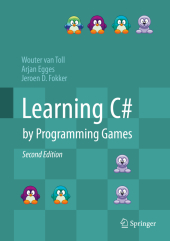 Neuerscheinungen 2019Stand: 2020-02-01 |
Schnellsuche
ISBN/Stichwort/Autor
|
Herderstraße 10
10625 Berlin
Tel.: 030 315 714 16
Fax 030 315 714 14
info@buchspektrum.de |

Arjan Egges, Jeroen D. Fokker, Wouter van Toll
(Beteiligte)
Learning C# by Programming Games
2. Aufl. 2019. xxvii, 622 S. 116 SW-Abb., 34 Farbabb. 235 mm
Verlag/Jahr: SPRINGER, BERLIN 2019
ISBN: 3-662-59251-7 (3662592517)
Neue ISBN: 978-3-662-59251-9 (9783662592519)
Preis und Lieferzeit: Bitte klicken
Requiring no programming experience, this book teaches game programming and the C# language. It discusses basic game structure, player input, game objects, game worlds, levels, animation, physics and intelligence, guiding the reader to create playable games.
Developing computer games is a perfect way to learn how to program in modern programming languages. This book teaches how to program in C# through the creation of computer games - and without requiring any previous programming experience.
Contrary to most programming books, van Toll, Egges, and Fokker do not organize the presentation according to programming language constructs, but instead use the structure and elements of computer games as a framework. For instance, there are chapters on dealing with player input, game objects, game worlds, game states, levels, animation, physics, and intelligence. The reader will be guided through the development of four games showing the various aspects of game development. Starting with a simple shooting game, the authors move on to puzzle games consisting of multiple levels, and conclude the book by developing a full-fledged platform game with animation, game physics, and intelligent enemies. They show a number of commonly used techniques in games, such as drawing layers of sprites, rotating, scaling and animating sprites, dealing with physics, handling interaction between game objects, and creating pleasing visual effects. At the same time, they provide a thorough introduction to C# and object-oriented programming, introducing step by step important programming concepts such as loops, methods, classes, collections, and exception handling.
This second edition includes a few notable updates. First of all, the book and all example programs are now based on the library MonoGame 3.6, instead of the obsolete XNA Game Studio. Second, instead of explaining how the example programs work, the text now invites readers to write these programs themselves, with clearly marked reference points throughout the text. Third, the book now makes a clearer distinction between general (C#) programming concepts and concepts that are specific to game development. Fourth, the most important programming concepts are now summarized in convenient "Quick Reference" boxes, which replace the syntax diagrams of the first edition. Finally, the updated exercises are now grouped per chapter and can be found at the end of each chapter, allowing readers to test their knowledge more directly.
The book is also designed to be used as a basis for a game-oriented programming course. Supplementary materials for organizing such a course are available on an accompanying web site, which also includes all example programs, game sprites, sounds, and the solutions to all exercises.
1 Building Your First Game Application.- 2 What Is Programming?.- 3 Game Programming Basics.- 4 Creating a Game World.- 5 Showing what the Player is Doing.- 6 Reacting to Player Input.- 7 Basic Game Objects.- 8 Communication and Interaction Between Objects.- 9 A Limited Number of Lives.- 10 Organizing Game Objects.- 11 Finishing the Game.- 12 Dealing with Different Screen Sizes.- 13 Arrays and Collections.- 14 Game Objects in a Structure.- 15 Gameplay Programming.- 16 Finishing the Game.- 17 Better Game State Management.- 18 User Interfaces and Menus.- 19 Loading Levels from Files.- 20 Gameplay Programming.- 21 Finishing the Game.- 22 Creating the Main Game Structure.- 23 Animated Game Objects.- 24 Game Physics.- 25 Intelligent Enemies.- 26 Finishing the Game.


